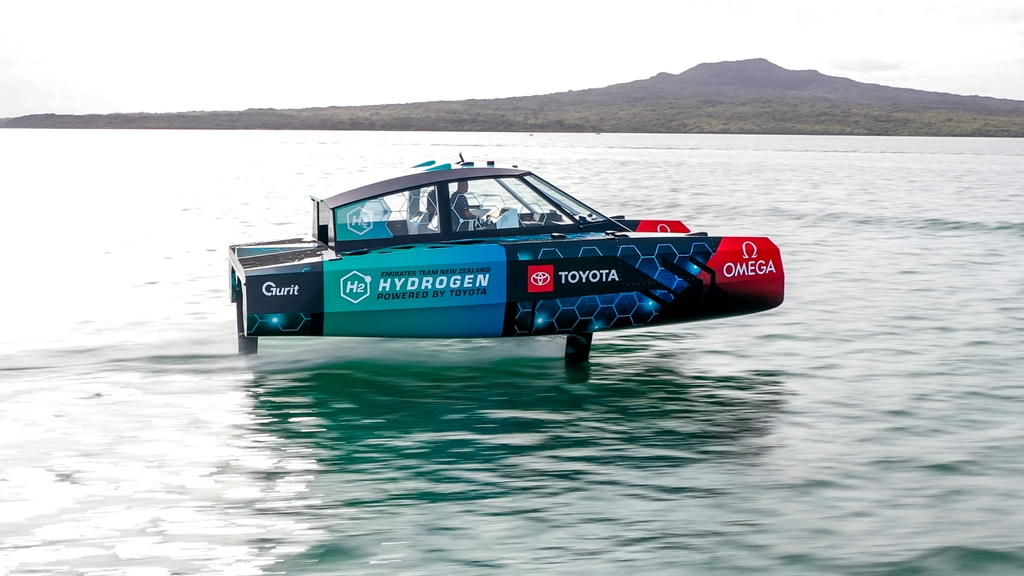Emirates Team New Zealand has commissioned and tested “Chase Zero,” a hydrogen-powered foiling chase boat, on Auckland’s Hauraki Gulf. The top speed of Chase Zero to date was clocked at 50.3 knots (93.16km/hour) on its ninth day of testing. Toyota provided the pre-production hydrogen fuel cells units for Chase Zero.
The US Department of Energy’s Lawrence Berkeley National Laboratory has looked at sponge-like materials known as “metal-organic frameworks.” The have found that they could be cost-competitive with other energy storage technologies for backup power with further development. Hydrogen can be stored in the porous crystal materials made of metal ions. The techno-economic analysis and process modeling analyzed system performance in “Cost and potential of metal–organic frameworks for hydrogen backup power supply,” which was recently published in Nature Energy. “Specifically for backup power applications, they have a simple charge/discharge mechanism, allowing the stored hydrogen to be released immediately upon discharge without the use of chemical reactions, which typically require high temperatures,” said Berkeley Lab postdoctoral researcher Peng Peng.
The US National Renewable Energy Laboratory (NREL) said perovskite materials could play a key role in a chemical process to produce renewable hydrogen. “NREL scientists analyzed an emerging water-splitting technology called solar thermochemical hydrogen (STCH) production, which can be potentially more energy efficient than producing hydrogen via the commonly used electrolysis method … STCH relies on a two-step chemical process in which metal oxides are exposed to temperatures greater than 1,400 C and then re-oxidized with steam at lower temperatures to produce hydrogen,” said a team of researchers in “System and Technoeconomic Analysis of Solar Thermochemical Hydrogen Production,” which was recently published in Renewable Energy.
HydrogenOne and Foresight hae signed a final agreement to invest in Germany’s HH2E. They will acquire a minority stake and the right to a board seat for at least GBP 10 million ($12.5 million). The investors “will provide a substantial part of the development and construction capital covering five large projects. These projects are expected to be at industrial locations across Germany and will cost in excess of €500 million ($526.8 million) to fully develop,” HydrogenOne said. “The first project HH2E is expecting to launch is likely to be at an industrial site in Germany, where there are plans for a new facility starting up in 2025, supplying on-site industrial customers.”
Fortescue Future Industries (FFI) has announced plans to potentially turn old coal infrastructure into a green hydrogen production facility in Washington state. “FFI’s intention would be to seek to employ the existing coal workforce for the proposed project, facilitating a transition into the emerging green energy economy,” the company said.
Bureau Veritas has approved the second generation of the REXH2 developed by EODev, a turnkey power generator for the supply of low-carbon electricity on ships. “The procedure to obtain Type Approval on the definitive version of the new REXH2 has already started and is expected to be completed by the end of 2022,” EODev said. EODev also noted that it has signed a collaboration agreement with MobyFly “for the design of the first hydrogen hydrofoil for passenger transport.”
Empresa Municipal de Transportes de Madrid has awarded a €10.86 million contract to build a hydrogen plant and a PV installation at the Entrevías Operations Center. “The new refueling station will provide several green hydrogen refueling stations for the fleet of 10 buses that EMT plans to acquire in a first phase. The project involves the implementation of the necessary facilities for the production, storage and distribution of hydrogen. It also includes the installation and commissioning of photovoltaic panels capable of generating all the energy necessary for the production of H2 from renewable sources,” said the company, which operates Madrid’s municipal transportation network. It will take around 19 months to execute the project.
Air Liquide, Portugal’s CaetanoBus, and Toyota Motor Europe have signed a memorandum of understanding to develop integrated hydrogen solutions in Europe. “This will include infrastructure development and vehicle fleets, to accelerate the expansion of hydrogen mobility for both light and heavy-duty vehicles,” the three companies said in a joint statement this week.
This content is protected by copyright and may not be reused. If you want to cooperate with us and would like to reuse some of our content, please contact: editors@pv-magazine.com.


2 comments
By submitting this form you agree to pv magazine using your data for the purposes of publishing your comment.
Your personal data will only be disclosed or otherwise transmitted to third parties for the purposes of spam filtering or if this is necessary for technical maintenance of the website. Any other transfer to third parties will not take place unless this is justified on the basis of applicable data protection regulations or if pv magazine is legally obliged to do so.
You may revoke this consent at any time with effect for the future, in which case your personal data will be deleted immediately. Otherwise, your data will be deleted if pv magazine has processed your request or the purpose of data storage is fulfilled.
Further information on data privacy can be found in our Data Protection Policy.